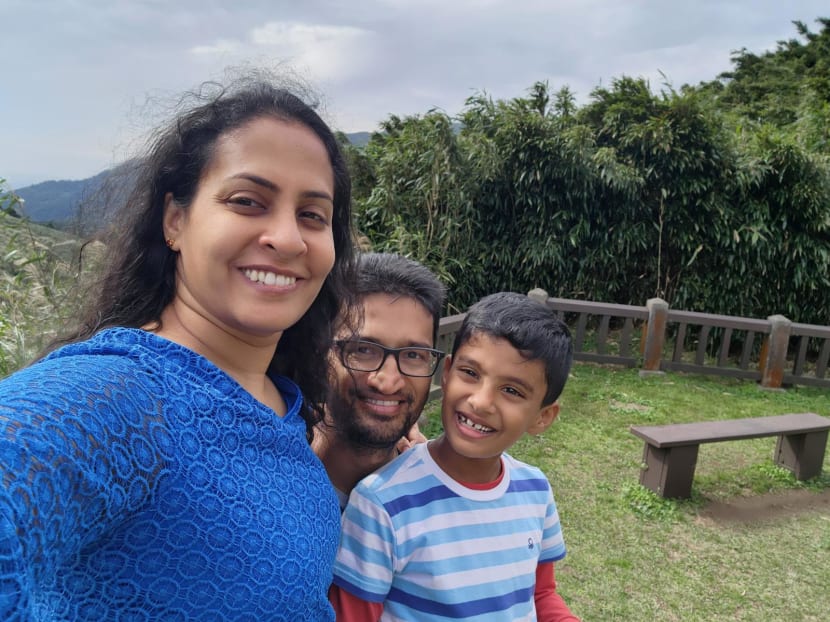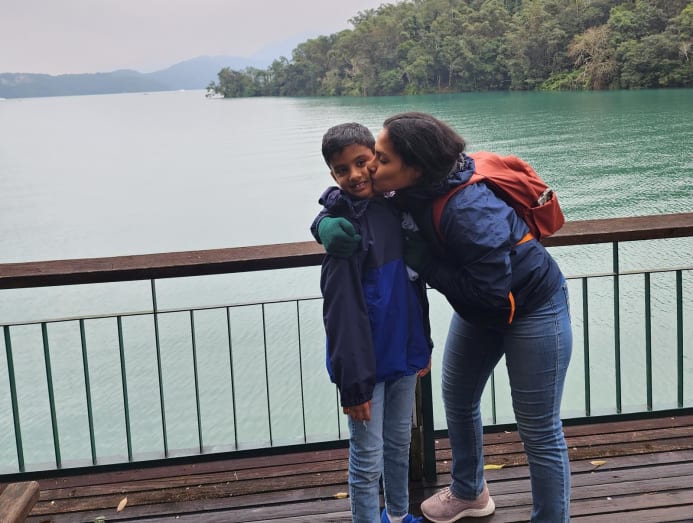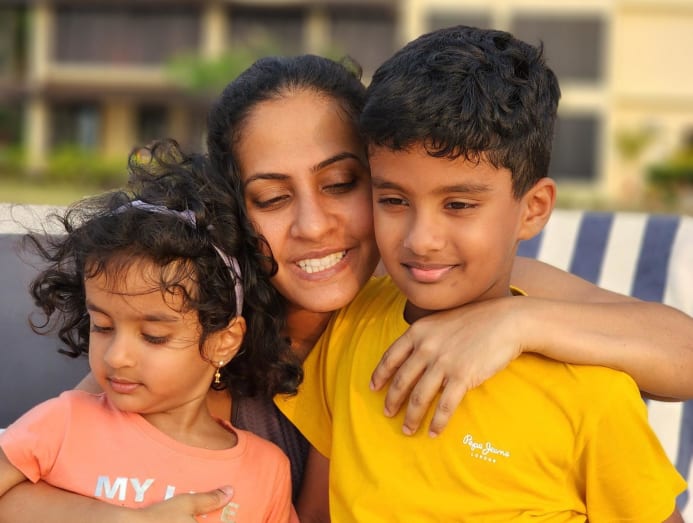Learning to let go of my parental guilt is an ongoing process, but I’m getting there
Ever felt like guilt is an inescapable part of being a parent? Ms Swetha Vigraham is right there with you, though this mum-of-two has finally learnt how to embrace guilt, rather than letting it get her down.

From left: Ms Swetha Vigraham with her husband, Mr Mahesh Sethuraman, and her son Sushena. (Photo: Mahesh Sethuraman)

This audio is generated by an AI tool.
When I first became a mum, I thought surviving those first couple years of sleepless nights and endless diaper changes would be the toughest part of the journey.
Little did I know that guilt would follow me like a constant companion all throughout my parenting journey, well beyond my child's newborn stage.
GUILT AS A WORKING MOTHER
In 2017, I was at the end of a work trip to Bangkok in Thailand, on my way to the airport for my flight home, when my husband called.
Our 18-month-old son was having seizures and my husband was rushing him to the hospital.
As our baby was admitted to the children’s ward, I was at Suvarnabhumi Airport, reading my husband’s messages over and over again. The flight back was the longest two-and-a-half hours of my life.
Upon landing, I headed straight to the hospital. Despite my exhaustion from the trip, I insisted on staying there with my son that night. I watched him sleep, worry gnawing at me while we waited for a diagnosis.
The next morning, the doctors assured us that it was a one-off incident and that he could be discharged, but he was to be monitored closely for any further symptoms. Only then did I finally feel some semblance of relief.
When I returned home, guilt swept over me.
Logically, I knew I couldn’t have foreseen or stopped the seizures.
Emotionally, the thought of being absent in his moment of crisis was devastating. I obsessed over the question: “Am I prioritising work over my child’s well-being?”
Before this incident, I’d thought I could have it all – juggling a high-flying career with client presentations while pumping milk on the go in airports and conference rooms. But this experience left me questioning if I was truly getting it right.
GUILT AS A STAY-AT-HOME MOTHER
Some years later, corporate restructuring left me in a role that wasn’t the right fit. I decided to quit, seeing it as an opportunity to make up for lost time with my son.
At first, he was thrilled. I was there to welcome him home with a big hug every day.
But it didn’t take long for my involvement to feel suffocating – for both of us. I was constantly checking his assignment book, insisting he use a ruler for straight lines and reminding him to write out his mathematics workings clearly on the right side.
He started making small but earnest comments, often during bedtime routines at night.
“Maybe you could be less strict about my handwriting.”
“Maybe I could have a few vegetable-free lunches.”
“Maybe I could have more TV time.”
His honesty stung a little, but it also made me realise that I’d been trying so hard to compensate for my previous guilt around not being physically present enough that I was unintentionally smothering his freedom.
I decided to focus less on my urges to “make up” for past shortcomings and more on creating positive memories with him now.

GUILT AS A PROVIDER
When I became a stay-at-home parent, guilt took on a different form.
I have always been big on online shopping. Long before they could count to 10, my kids knew about out-of-stock notifications and delivery lead times. My neighbour once teased me for robbing my kids of the experience of window shopping.
I’d always laughed it off, but now that I had more time on my hands, I decided to give it a shot.
I took my son to a big toy store and he lit up instantly. He wandered through aisles of action figures, played with toy drones and pointed excitedly at a giant car playset. “It’s the coolest thing I’ve ever seen!” he declared.
I looked at the price tag and knew it wasn’t a prudent choice now that we had become a single-income family. I reminded him of the three Rs (reduce, reuse, recycle), promised him a water gun during an upcoming sale and distracted him with ice cream.
On the train ride home, he asked: “Can we buy the toy after you get a job?”
It was an innocent enough question. He wasn’t trying to criticise or pressure me.
But once again, guilt wracked me and I wondered: “Am I depriving my kids of a better lifestyle by not working?”
Instead of wallowing in guilt over what I couldn’t give him, I chose to focus on what I could: Time.
We started spending evenings together at the playground and weekends exploring Singapore’s parks. Soon, he started looking forward to the time we could spend together doing fun things, rather than thinking of material gifts.
It also gave us plenty of opportunities to grow even closer to each other.
THREE “A”s FOR DEALING WITH PARENTAL GUILT
After nine years of being a parent, I’ve learnt that guilt is an inevitable part of the journey. No matter our personal or professional circumstances, we will always feel like we’re falling short in some way.
New mums feel guilty about returning to work and leaving their babies in infant care. Fit dads struggle to balance their training routines and childcare needs without overburdening their partners. Some working parents even feel guilty that they don’t have time to make breakfast for their children.
But while guilt is often part and parcel of the parenting journey, it doesn’t have to define it.

Here’s my personal playbook for understanding and handling parental guilt:
1. Acknowledge feelings of guilt
When I sense the feeling of guilt overcoming me, I don’t ignore or suppress it. It’s a signal not for condemnation, but self-reflection. I take time and space to let myself sit with it.
2. Assert priorities and set boundaries
I figure out what matters most and set boundaries to protect those priorities. This may mean saying no to extra work or asking for support at home. I’ve also learnt that it’s important to reevaluate and reassess my boundaries regularly.
3. Accept yourself for who you are
Show yourself compassion. If we can’t be kind to ourselves, how can we teach kindness to our children?
WHAT REALLY MATTERS
Parenting isn’t about perfection; it’s about showing up every day with intention.
As parents, our child’s well-being is our top priority. We may not always have the time or energy to meet every expectation or fulfil their every need. We may stumble, falter and doubt ourselves.
Sometimes, the guilt becomes a vicious circle. We push ourselves harder to reach impossibly high standards, only to feel guilty for letting something else fall to the wayside in the process – our work, for instance, or our spouses.
But the journey of parenting isn’t a race to be the “best”. It’s about showing up, every single day, doing the best we can for our children with what we have.
And in the end, that is what matters most.
Swetha Vigraham is the founder of Bricks and Blocks Coaching, a platform for parent coaching. She is also the creator and host of Everyday Parenting, a podcast where she invites guests to share their experiences on parenting.
If you have an experience to share or know someone who wishes to contribute to this series, write to voices [at] mediacorp.com.sg with your full name, address and phone number.













